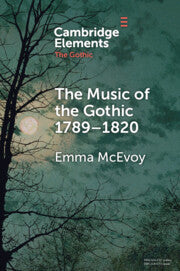The Music of the Gothic 1789–1820
- Unit price
- / per
-
Author:Emma Mcevoy
-
ISBN:9781009170376
-
Publication Date:January 2025
-
Edition:1
-
Pages:96
-
Binding:Paperback
-
Publisher:Cambridge University Press
-
Country of Publication:United Kingdom


A Back Order button means that we don’t have the book in stock at our store. It may already be on order – or we can order it for you from a publisher or distributor at no additional cost.
As we source items from around the globe, a back-order can take anywhere from 5 days to several weeks to arrive, depending on the title.
To check how long this might take, you’re welcome to contact us and we can provide an ETA or any other information you need. We recommend checking the timeframe before committing to an online order.
The Music of the Gothic 1789–1820
- Unit price
- / per
-
Author:Emma Mcevoy
-
ISBN:9781009170376
-
Publication Date:January 2025
-
Edition:1
-
Pages:96
-
Binding:Paperback
-
Publisher:Cambridge University Press
-
Country of Publication:United Kingdom
Description
Music plays an essential role in Gothic in the years 1789–1820, but it signifies very differently at the end of the period compared with the beginning. In the 1790s, the music of Gothic novels and plays is not Gothic music; it is celebratory, calming or transcendent rather than scary. By 1820, the music of Gothic is more likely to provoke shock, discomfort and unease. Melodrama brings about this change. Its ascendancy had long-lasting effects on the music of the Gothic more generally – in fiction and poetry, on the stage and the screen. The book considers work by writers including Ann Radcliffe, Matthew Lewis, Eliza Fenwick, Samuel Taylor Coleridge and James Boaden in conjunction with music by composers such as Michael Kelly, Stephen Storace and Samuel Arnold.
Audio files of the music accompany the book.
Adding product to your cart
You may also like
A Back Order button means that we don’t have the book in stock at our store. It may already be on order – or we can order it for you from a publisher or distributor at no additional cost.
As we source items from around the globe, a back-order can take anywhere from 5 days to several weeks to arrive, depending on the title.
To check how long this might take, you’re welcome to contact us and we can provide an ETA or any other information you need. We recommend checking the timeframe before committing to an online order.
You may also like
You may also like
-
Music plays an essential role in Gothic in the years 1789–1820, but it signifies very differently at the end of the period compared with the beginning. In the 1790s, the music of Gothic novels and plays is not Gothic music; it is celebratory, calming or transcendent rather than scary. By 1820, the music of Gothic is more likely to provoke shock, discomfort and unease. Melodrama brings about this change. Its ascendancy had long-lasting effects on the music of the Gothic more generally – in fiction and poetry, on the stage and the screen. The book considers work by writers including Ann Radcliffe, Matthew Lewis, Eliza Fenwick, Samuel Taylor Coleridge and James Boaden in conjunction with music by composers such as Michael Kelly, Stephen Storace and Samuel Arnold.
Audio files of the music accompany the book.
-
-
Author: Emma McevoyISBN: 9781009170376Publication Date: January 2025Edition: 1Pages: 96Binding: PaperbackPublisher: Cambridge University PressCountry of Publication: United Kingdom
Music plays an essential role in Gothic in the years 1789–1820, but it signifies very differently at the end of the period compared with the beginning. In the 1790s, the music of Gothic novels and plays is not Gothic music; it is celebratory, calming or transcendent rather than scary. By 1820, the music of Gothic is more likely to provoke shock, discomfort and unease. Melodrama brings about this change. Its ascendancy had long-lasting effects on the music of the Gothic more generally – in fiction and poetry, on the stage and the screen. The book considers work by writers including Ann Radcliffe, Matthew Lewis, Eliza Fenwick, Samuel Taylor Coleridge and James Boaden in conjunction with music by composers such as Michael Kelly, Stephen Storace and Samuel Arnold.
Audio files of the music accompany the book.
-
Author: Emma McevoyISBN: 9781009170376Publication Date: January 2025Edition: 1Pages: 96Binding: PaperbackPublisher: Cambridge University PressCountry of Publication: United Kingdom
-



